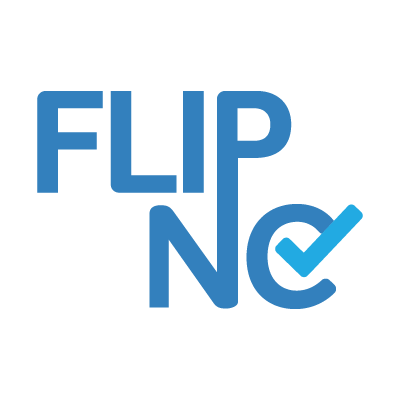On March 7, FLIP NC was represented on the airwaves, via an interview with Aaron Keck of WCHL.
In the studio
FLIP NC’s Andrea Cash (right) and Amy Cox (center) join WCHL’s Aaron Keck
Some highlights:
Primary Takeaways & Our 2024 Pivot
We have a lot of work to do to turn out voters this year in North Carolina, if the low primary turnout is any indication. FLIP NC is focused on down-ballot races in a year where people aren’t necessarily enthused about the top of the ticket. We have pivoted to focus on statewide courts, having centered our previous work around General Assembly seats, because we feel that there is an absence of voter outreach being done for judicial races. Plus, our ultimate goal is to get fair maps in North Carolina, and the courts are our one big shot. Volunteer groups like Neighbors on Call are a great option for volunteers who want to spread the word about critical seats in the N.C. House and N.C. Senate.
The Long Game
We won’t flip our Supreme Court this year. Democrats need to defend one N.C. Supreme Court seat in 2024 and one in 2026. Then, hopefully, Democrats can flip at least two of the three Republican seats up in 2028 to hold a majority on the court. We can also win a majority on the Court of Appeals by 2028.
The Candidates
Fortunately, we have outstanding Democratic judicial candidates in North Carolina this year. Justice Allison Riggs is defending her seat on the N.C. Supreme Court. She previously served on the Court of Appeals and is known for her work as a civil rights attorney with the Southern Coalition for Social Justice. Fighting on behalf of the marginalized and disenfranchised, she has argued redistricting cases in front of the U.S. Supreme Court.
In terms of the Court of Appeals, Judge Carolyn Thompson is defending her seat, and Martin Moore and Ed Eldred are aiming to flip two GOP-held seats.
The Importance of Voting the Full Ballot
We don’t have straight-ticket voting in North Carolina anymore, and that hurts Democrats. We saw in the Democratic primary this week that voters made their choice for the U.S. President, and then 1.5% didn’t make a selection in the governor’s race, while another 5% didn’t make a selection in the N.C. Supreme Court contest. Down-ballot dropoff has cost Democrats elections in the past. Cheri Beasley lost her race for N.C. Supreme Court Chief Justice by just 401 votes. If just a fraction of the voters in Durham alone who voted for U.S. President had also voted for Beasley in the Chief Justice race, she would have won. When we can get voters’ attention on down-ballot races and the importance of filling out the full ticket, that helps with up-ballot contests, such as the governor’s race, in addition to critical down-ballot contests.
FLIP NC’s Approach
We need to start now in order to reach less engaged voters. When volunteers approach less engaged voters right before an election and are asking for something, it’s not as effective. We did this in 2017 and 2018 for the 2018 election – the early contact that we made was much more effective than when we spoke with voters right before the election. We talk to left-leaning voters about the issues that matter to them and focus on having a conversation and providing information rather than asking them for something.
Get Involved
In 2020, 75% of North Carolina’s registered voters cast a ballot – an all-time high. Still, 1.8 million registered voters in the state did not vote that year. We have a lot of work to do to close that gap. Canvass with us starting March 10 in Durham – we talk to left-leaning voters, so this isn’t about persuasion. We make our canvasses fun by debriefing afterward and enjoying drinks and snacks. Donations are extremely helpful. We are an all-volunteer organization completely funded by small, individual donors. The more funds we raise, the more voters we can reach this year. We also encourage people to join our email list and follow us on social media (X, Instagram, Facebook).

